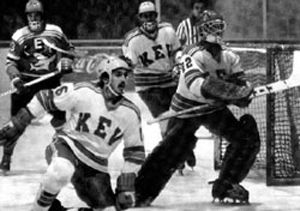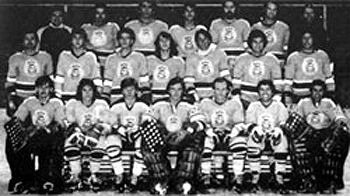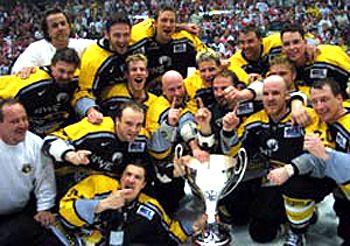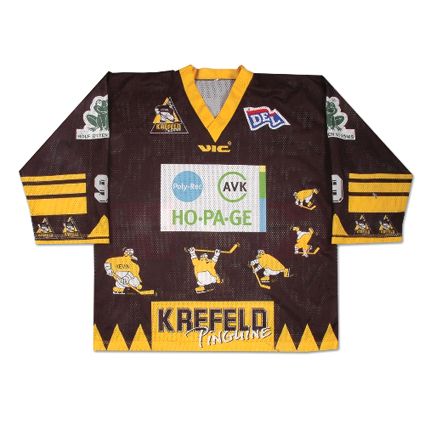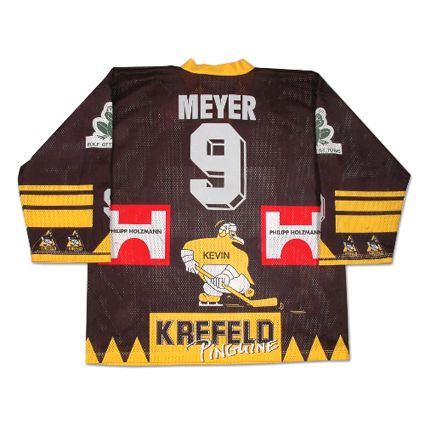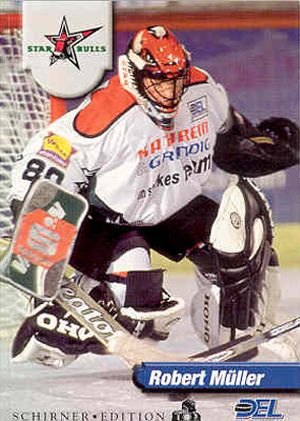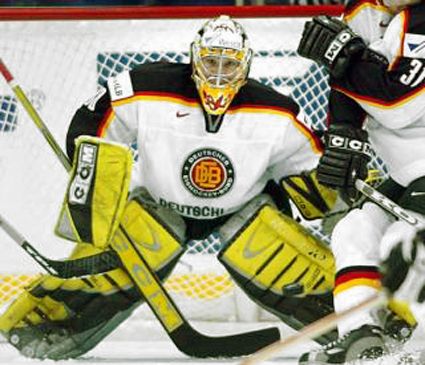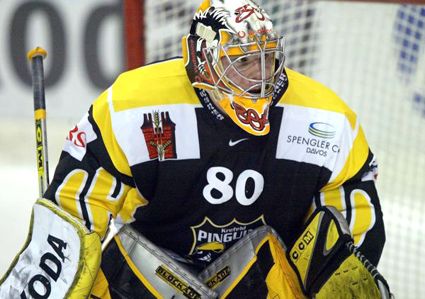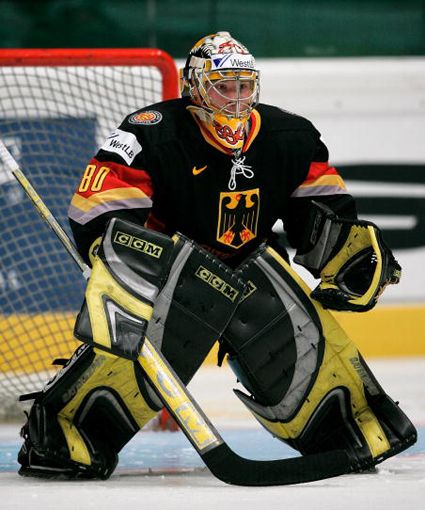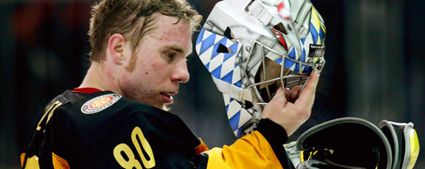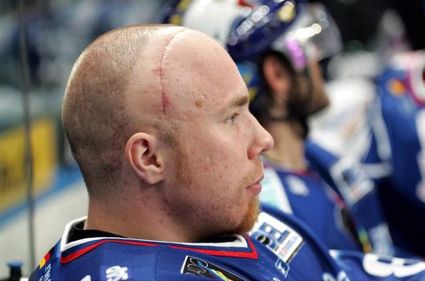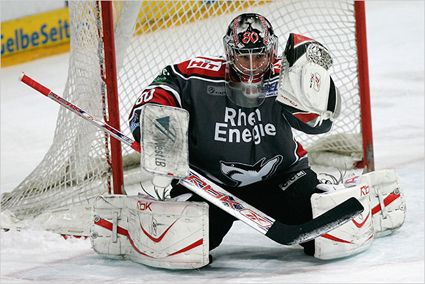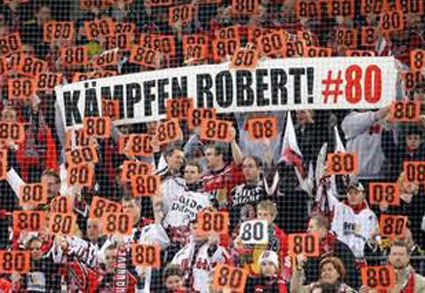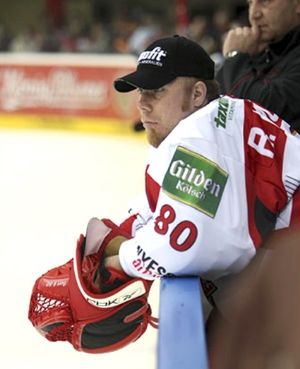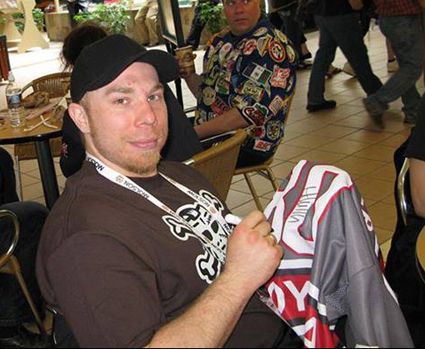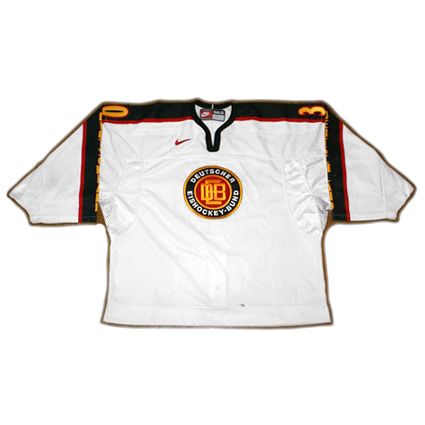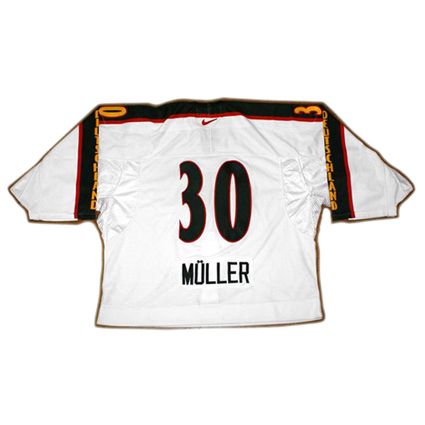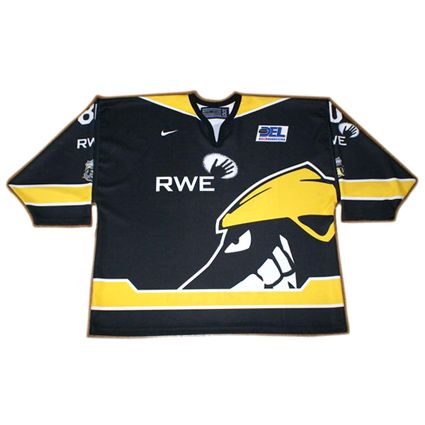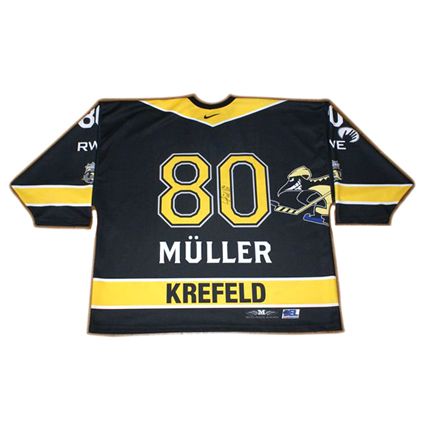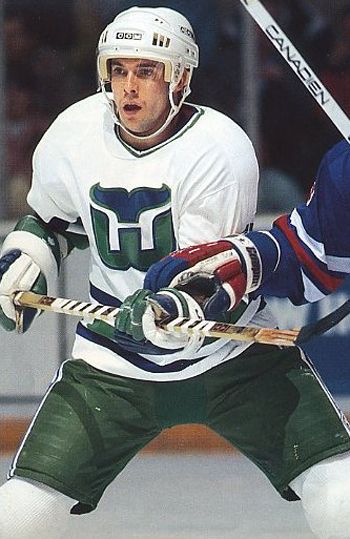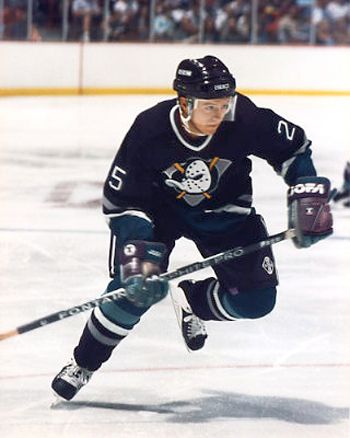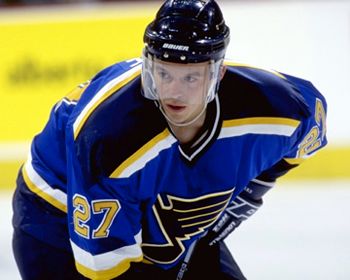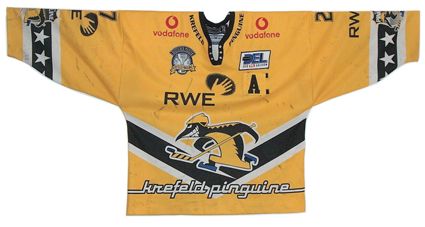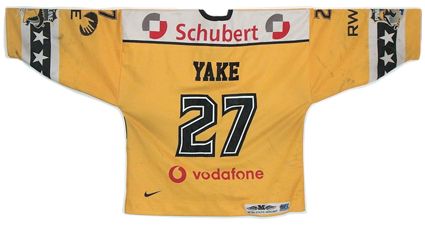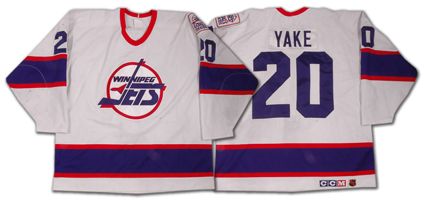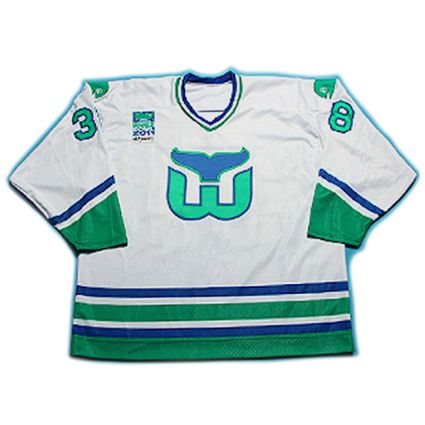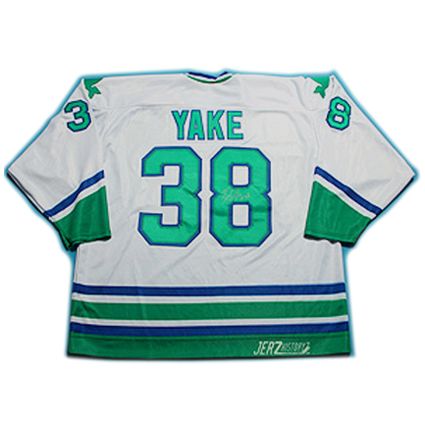Showing posts with label Krefeld Penguins. Show all posts
Showing posts with label Krefeld Penguins. Show all posts
Wednesday, July 9, 2014
1996-97 Krefeld Penguins Jason Meyer jersey
July by the Numbers continues and it's back across the Atlantic for jersey #9.
Founded in 1936 as Krefelder Eislauf-Verein 1936 e.V. (KEV for short), the club, after returning after a suspension of play during World War II, won their first championship on March 12, 1952.
After struggling near the bottom of the Bundesliga for a decade and a half, thanks in part to competing with a local rival club, things really began to look up for KEV with some key acquisitions and the demise of the other Krefeld based club, KTSV Prussia in 1971.
Just as the club was knocking on the door of a title, in a shocking turn of events, ownership had overextended itself in previous seasons and the club's actual financial condition had not been accurately reported, all of which resulted in bankruptcy for KEV, which caused the German sporting authorities to revoke the team's franchise.
A new club, EHC Krefeld was formed in 1978-79, which started at the bottom of the German hockey ladder, playing in a regional league with junior players and older players, some of whom were lured back out of retirement. This club proved far stronger than their opposition, even posting a memorable 48-0 win!
The inaugural ECH Krefeld club
With the club now promoted up a level, many of the older players once again retired, their mission accomplished. New, younger players were brought in for the 1979-80 season, which resulted in a fine second place finish. Fate intervened however, as first place finisher Hamburg SV declined the opportunity to move up for financial reasons, moving EHC up the ladder once again.
When the 1980-81 season began, the club was now renamed Krefelder Eislauf-Verein 1981 e.V., reviving the name of the original club founded back in 1936. Their rise to the top division was slowed however, as the quality of competition was much stronger in the second division than it was in the third and fourth levels of the past two seasons.
The club endured for 11 seasons in the second division, and again flirted with financial problems and relegation on occasion, but persevered until the 1990-91 season, which began poorly with KEV at the bottom of the table. Bold moves were made to bring in Czech national team goaltender Karel Lang, as well as the high scoring Francois Sills and Peter Jedrus. With the revamping of the lineup complete, the wins soon followed and by the time the playoffs began, KEV had climbed to second place and their victory in the playoffs propelled the club, and once more the city of Krefeld, into the top level of the Bundesliga.
While their play on the ice was enough to keep KEV in the 1. Bundesliga, they once more faced bankruptcy in 1995, only this time a last minute reorganization allowed the club to retain it's license for the 1995-96 season, now reorganized as KEV Pinguine Eishockey GmbH, or Krefeld Pinguine (Krefeld Penguins). This was also the period of time when the Bundesliga gave way to the new DEL hockey league, ushering in a new era for German professional hockey, particularly with the ruling that made players all across Europe free agents when their current contracts expired, allowing a much greater freedom of movement for players previously unable to play in Germany.
After becoming the Krefeld Penguins and a member of the DEL, they regularly made the playoffs, reaching the postseason in five consecutive seasons. They missed the playoffs in 2001, but returned again in 2002.
While the club only managed a sixth place finish in 2002-03, the upset the DEG Metro Stars in five games before knocking out the #1 seeded Berlin Polar Bears 3-1 to reach their first ever finals despite the Polar Bears finishing 31 points higher in the regular season standings. There, they met the Cologne Sharks, the #1 overall seed. Krefeld won Games 1 & 2, but lost the next two, including Game 4 in overtime, which forced a deciding Game 5, which the Penguins won by a score of 3-1 to take the series and the championship 3 games to 2 to capture the first title in club history, second if you count the Penguins as a continuation of the first KEV club, founded back in 1936.
The Krefeld Penguins - 2003 DEL champions
During the regular season, Penguins Christoph Brandner (formerly of the Minnesota Wild) led the league with 28 goals, while teammate Brad Purdie was tops in assists with 41. Other notable names on the championship squad were future NHLer Christian Ehrhoff, Canadians and former NHLers Gary Shuchuk and Sandy Moger and the late Robert Müller in goal.
Today's featured jersey is a 1996-97 Krefeld Penguins Jason Meyer jersey. Worn shortly after the club changed their name to include the Penguins nickname, this attempt at a whimsical jersey crosses into the absurd, with with it's tumbling, celebrating penguins surrounding the main sponsor logo on the chest, which itself is an overly large, color-clashing obnoxious billboard.
Adding to the visual confusion is the main team logo of a penguin in a triangle, which is not only on the upper right chest, which would have been fine if they would have stopped there, but it is repeated in a smaller size around the cuffs, as if the five tumbling ones on the front of the jersey weren't enough already! Worse, the triangle shape is then repeated around the waist as well as another one on the cuffs for good measure. Here's an idea. If you want to repeat the team logo around the arms, how about not putting triple arm stripes of varying widths just above them to distract from them?
While we're at it, we also dislike the lousy way the team name is applied to the bottom of both the front and back, particularly the handwritten, juvenile "Pinguine" diagonally across the name of the city.
If the main sponsorship slapped on the front of the jersey like a bumper sticker wasn't bad enough, the back has a pair of bold red logos and the shoulders are adorned with winking green frogs, only adding to the mess that this jersey is!
Don't even ask us why the penguin on the right front, which is repeated larger on the back, has the name "Kevin" on it. We don't even want to know because it's certain to be stupid if we ever found out.
Later Penguins jerseys would have a certain style and flair, but this particular one is a collection of bad ideas lumped together all on one awful jersey - one with frogs and tumbling penguins, one of which is named Kevin.
Today's video section is a look at the history of the franchise in pictures and video, which captures the widely varying jerseys worn by the club in it's history, some good, some simply horrid.
Labels:
Krefeld Penguins
Tuesday, June 25, 2013
1999-00 Germany National Team Robert Müller Jersey
Born on June 25, 1980, Robert Müller began his career with the Star Bulls Rosenheim in the German Junior hockey league in the 1996-97 season. That same season, Müller also made his international debut with Germany at the 1997 European Junior Championships, the first of many such appearances in international competitions for the young goaltender.
His second season saw him compete with EHC Klostersee in the German second division as well as making a return to the European Junior Championships B Pool, where he was named the Best Goalkeeper at the tournament.
In 1998-99 Müller returned to his hometown Star Bulls Rosenheim, only now in the senior level German DEL. In addition to moving up to the DEL, he also made his senior level international debut at the World Championships B Pool in 1999.
Müller was back with Star Bulls for a final season in 1999-00 and then competed in both the World Juniors B Pool and the World Championships B Pool where he played two games as Germany successfully won promotion to the A Pool with a 6-1 record.
For the 2000-01 season, Müller joined Adler Mannheim (Mannheim Eagles), who dominated the league with a 40-16-4 record for first place overall and then defeated the Berlin Capitals, Hannover Scorpions and the Munich Barons to win the DEL championship. He also competed in qualifying for the following year's Olympics as well as the 2001 World Championships at home in Germany. Following the season, Müller was selected in the 9th round of the NHL Entry Draft by the Washington Capitals, who also employed Müller's Germany National Team teammate and fellow goaltender Olaf Közig.
It was back to the Mannheim Eagles for 2001-02, a season which also saw Müller appear in the DEL All-Star Game as well as making his Olympic debut in Salt Lake City followed by another World Championships later that spring.
Müller was again on the move for the 2002-03 season, as he joined the Krefeld Penguins (Krefeld Penguine) as their undisputed number one goaltender, appearing in 47 of the team's 50 regular season games. While Krefeld finished mid-pack during the regular season, 7th out of 14, it was enough to become one of the eight playoff qualifiers. Once the playoffs began, Krefeld easily handled the 3rd ranked DEG Metro Stars 4-1 before knocking off the top ranked Berlin Polar Bears 3-1. Proving that was no fluke, Müller won his second DEL title after the Penguins defeated the second seeded Cologne Sharks in the finals 3 games to 2 with Müller in goal for all 14 of Krefeld's games. He concluded his season with the Germany National Team at the 2003 World Championships.
His second season with Krefeld again saw him handle the vast majority of the games, appearing in 49 of their 52 games. Also that season, during the Christmas break, Müller and the Penguins travelled to Switzerland to participate in the annual Spengler Cup tournament. With Krefeld failing to qualify for the postseason, Müller joined EHC Basel in the Swiss National League A in their effort to avoid relegation for the following season. Müller then made his now customary appearance at the World Championships, his sixth consecutive time making the German squad.
Prior to the start of the 2004-05 season, Müller played for Germany at the 2004 World Cup of Hockey. Once the DEL season would get underway, Müller would play 47 of the Penguins 52 games. He would again fulfill his international duties at the World Championships, which would not go Germany's way, as they were relegated for the 2006 season.
His fourth season with Krefeld would see the workhorse Müller now set a personal high with 51 appearances out of a possible 52 as Krefeld returned to the playoffs for the first time since 2001. He would also participate in his second Olympic Games during 2006 before Germany sought to return to the Top Division of the World Championships, which required them to participate in the Division I Group A Worlds in France.
Germany announced their intentions of a quick return with an opening 11-2 win over Israel. Müller then made his first start in fine fashion, shutting out Japan 4-0. Great Britain then fell 8-0 for Müller's second consecutive blanking. He stayed unbeaten with a 6-2 win over Hungary and then recorded his third shutout in five starts over the host French 5-0 to finish the tournament with a 0.50 goals against average to earn the Best Goalkeeper of the tournament award as well as accomplishing Germany's goal of returning Germany to the Top Division on their first attempt.
He returned to Adler Mannheim for the 2006-07 season, but was limited to 23 gamesafter being diagnosed with a brain tumor in November of 2006 when he began suffering from migraine headaches. Müller underwent surgery to remove the majority of the tumor and made his return to the Eagles on February 3, 2007 at the DEL All-Star Game despite the fact he was still undergoing chemotherapy and radiation treatments.
Müller would start the 2007-08 season with Mannheim (5 games), but had lost his starting job and was loaned to EV Duisburg. He would play 12 games with the Foxes before he found a new home as the number one goaltender with Kölner Haie (Cologne Sharks). Müller appeared in 24 games for the Sharks before leading them to the DEL finals, playing in 14 additional playoff games, including winning an epic 6 overtime game, the second longest in professional hockey history during which he faced 100 shots on goal!
Having seemingly returned to full health, Müller would then make his ninth World Championship appearance for Germany at the conclusion of the season, raising his season total to 44 games played and his career total of international games to 127, which included two Olympics and a World Cup of Hockey.
Unfortunately, the brain tumor returned over the summer, which required a second operation and Müller now allowed his doctor to go public with his condition, who revealed that Müller was now terminally ill and had already exceeded the average anticipated life span of someone with brain cancer, as only 3% of people with his same diagnosis live beyond five years.
Courageously, and despite his dire prognosis, Müller returned to the ice to play in two games during the early part of the 2008-09 Sharks season, the first being just 44 days after his second operation.
Sadly, those two games would prove to be his last, as his doctor would no longer clear him to play as his condition worsened in December of 2008.
Müller passed away five months later on May 21, 2009 at the age of 28, two and a half years after the initial discovery of his tumor, but not before being inducted into the German Hall of Fame in March of 2009.
“We are shocked and very sad. Robert was a great personality,” Thomas Eichin, general manager of his last club Kölner Haie, said in an announcement on Friday. “He impressed us all and was an idol for many people not only as a sportsman. He will leave a big hole. Our thoughts are with his family. We wish them strength in this difficult time.”
“With his strong will, Müller inspired many people in their battle against the terrible disease,” Franz Reindl, the general secretary of the German Ice Hockey Association, said. “He showed us all what it means to never give up.”
At first, four clubs, the Cologne Sharks, Mannheim Eagles and his first senior club EHC Klostersee, as well as EHC Munich, whom he had never played for, would all retire his jersey #80. The DEL then announced that starting with the 2009-10 season that the #80 would be permanently retired league wide.
Today's featured jersey is a 1999-00 Germany National Team Robert Müller jersey. as worn during the 2000 IIHF World Junior Division I Championships which were held in Minsk, Belarus where Müller played in 5 games with a 1.40 goals against average and a pair of shutouts.
This jersey carries the more traditional goaltender number of 30, rather than Müller's trademark #80 he would adopt in honor of the year he was born.
Bonus jersey: Today's bonus jersey is a 2002-03 Krefeld Penquine Robert Müller jersey which sports Müller's preferred #80 that would make him so recognizable on the ice.
This jersey is a prime example of the type of graphic treatment German DEL jerseys, with an overly large team logo, corporate sponsorships, unconventional striping elements and the playful use of the team logo on the back of the jersey, which give many DEL jerseys their offbeat personalities.
The photos of today's jerseys were generously supplied by Andy Friedmann, and if you would like to view more of his extensive and incredibly wide-ranging collection, please visit his website here.
In today's video section, Müller makes his first appearance for Cologne following his second surgery when he played in the final eight minutes of the Sharks victory.
Finally, in a moving tribute, Müller's career is recapped through a highlight video and he then conducts his final TV interview upon receiving an award in March of 2009 (likely his Hall of Fame induction) as he shows the affects of his worsening condition.
His second season saw him compete with EHC Klostersee in the German second division as well as making a return to the European Junior Championships B Pool, where he was named the Best Goalkeeper at the tournament.
In 1998-99 Müller returned to his hometown Star Bulls Rosenheim, only now in the senior level German DEL. In addition to moving up to the DEL, he also made his senior level international debut at the World Championships B Pool in 1999.
Müller made his DEL debut with Star Bulls Rosenheim
Müller was back with Star Bulls for a final season in 1999-00 and then competed in both the World Juniors B Pool and the World Championships B Pool where he played two games as Germany successfully won promotion to the A Pool with a 6-1 record.
For the 2000-01 season, Müller joined Adler Mannheim (Mannheim Eagles), who dominated the league with a 40-16-4 record for first place overall and then defeated the Berlin Capitals, Hannover Scorpions and the Munich Barons to win the DEL championship. He also competed in qualifying for the following year's Olympics as well as the 2001 World Championships at home in Germany. Following the season, Müller was selected in the 9th round of the NHL Entry Draft by the Washington Capitals, who also employed Müller's Germany National Team teammate and fellow goaltender Olaf Közig.
It was back to the Mannheim Eagles for 2001-02, a season which also saw Müller appear in the DEL All-Star Game as well as making his Olympic debut in Salt Lake City followed by another World Championships later that spring.
Müller during one of his many international appearances for Germany
Müller was again on the move for the 2002-03 season, as he joined the Krefeld Penguins (Krefeld Penguine) as their undisputed number one goaltender, appearing in 47 of the team's 50 regular season games. While Krefeld finished mid-pack during the regular season, 7th out of 14, it was enough to become one of the eight playoff qualifiers. Once the playoffs began, Krefeld easily handled the 3rd ranked DEG Metro Stars 4-1 before knocking off the top ranked Berlin Polar Bears 3-1. Proving that was no fluke, Müller won his second DEL title after the Penguins defeated the second seeded Cologne Sharks in the finals 3 games to 2 with Müller in goal for all 14 of Krefeld's games. He concluded his season with the Germany National Team at the 2003 World Championships.
The Penguins celebrating Müller's second
DEL championship trophy in 2003
His second season with Krefeld again saw him handle the vast majority of the games, appearing in 49 of their 52 games. Also that season, during the Christmas break, Müller and the Penguins travelled to Switzerland to participate in the annual Spengler Cup tournament. With Krefeld failing to qualify for the postseason, Müller joined EHC Basel in the Swiss National League A in their effort to avoid relegation for the following season. Müller then made his now customary appearance at the World Championships, his sixth consecutive time making the German squad.
Müller competing at the 2003 Spengler Cup tournament for Krefeld
Prior to the start of the 2004-05 season, Müller played for Germany at the 2004 World Cup of Hockey. Once the DEL season would get underway, Müller would play 47 of the Penguins 52 games. He would again fulfill his international duties at the World Championships, which would not go Germany's way, as they were relegated for the 2006 season.
Müller during the 2005 World Championships
His fourth season with Krefeld would see the workhorse Müller now set a personal high with 51 appearances out of a possible 52 as Krefeld returned to the playoffs for the first time since 2001. He would also participate in his second Olympic Games during 2006 before Germany sought to return to the Top Division of the World Championships, which required them to participate in the Division I Group A Worlds in France.
Getting ready for battle during the 2006 Olympics, his second Games
Germany announced their intentions of a quick return with an opening 11-2 win over Israel. Müller then made his first start in fine fashion, shutting out Japan 4-0. Great Britain then fell 8-0 for Müller's second consecutive blanking. He stayed unbeaten with a 6-2 win over Hungary and then recorded his third shutout in five starts over the host French 5-0 to finish the tournament with a 0.50 goals against average to earn the Best Goalkeeper of the tournament award as well as accomplishing Germany's goal of returning Germany to the Top Division on their first attempt.
He returned to Adler Mannheim for the 2006-07 season, but was limited to 23 gamesafter being diagnosed with a brain tumor in November of 2006 when he began suffering from migraine headaches. Müller underwent surgery to remove the majority of the tumor and made his return to the Eagles on February 3, 2007 at the DEL All-Star Game despite the fact he was still undergoing chemotherapy and radiation treatments.
Müller bearing the dramatic scar of his brain surgery
Müller would start the 2007-08 season with Mannheim (5 games), but had lost his starting job and was loaned to EV Duisburg. He would play 12 games with the Foxes before he found a new home as the number one goaltender with Kölner Haie (Cologne Sharks). Müller appeared in 24 games for the Sharks before leading them to the DEL finals, playing in 14 additional playoff games, including winning an epic 6 overtime game, the second longest in professional hockey history during which he faced 100 shots on goal!
Müller moved to the Cologne Sharks in 2007-08
Having seemingly returned to full health, Müller would then make his ninth World Championship appearance for Germany at the conclusion of the season, raising his season total to 44 games played and his career total of international games to 127, which included two Olympics and a World Cup of Hockey.
Courageously, and despite his dire prognosis, Müller returned to the ice to play in two games during the early part of the 2008-09 Sharks season, the first being just 44 days after his second operation.
The fans show their support and urge Müller to fight on
“I want to return to normality — I love the lifestyle of hockey and want to be part of the team,” he said. “For me, to be able to play ice hockey is the greatest.”
Müller said he recognized that it would be hard for him to play an entire game. But, he said, “I am delighted with every second on the ice,” and added he did not want special treatment. “If I play well, you can praise me, and if I play badly, you should criticize me,” he said.
“I have the disease, and I have to live with it.”Müller said he recognized that it would be hard for him to play an entire game. But, he said, “I am delighted with every second on the ice,” and added he did not want special treatment. “If I play well, you can praise me, and if I play badly, you should criticize me,” he said.
Sadly, those two games would prove to be his last, as his doctor would no longer clear him to play as his condition worsened in December of 2008.
Müller passed away five months later on May 21, 2009 at the age of 28, two and a half years after the initial discovery of his tumor, but not before being inducted into the German Hall of Fame in March of 2009.
“We are shocked and very sad. Robert was a great personality,” Thomas Eichin, general manager of his last club Kölner Haie, said in an announcement on Friday. “He impressed us all and was an idol for many people not only as a sportsman. He will leave a big hole. Our thoughts are with his family. We wish them strength in this difficult time.”
“With his strong will, Müller inspired many people in their battle against the terrible disease,” Franz Reindl, the general secretary of the German Ice Hockey Association, said. “He showed us all what it means to never give up.”
At first, four clubs, the Cologne Sharks, Mannheim Eagles and his first senior club EHC Klostersee, as well as EHC Munich, whom he had never played for, would all retire his jersey #80. The DEL then announced that starting with the 2009-10 season that the #80 would be permanently retired league wide.
Always popular with the fans, Müller taking the time to
sign an instantly recognizable #80 jersey
Today's featured jersey is a 1999-00 Germany National Team Robert Müller jersey. as worn during the 2000 IIHF World Junior Division I Championships which were held in Minsk, Belarus where Müller played in 5 games with a 1.40 goals against average and a pair of shutouts.
This jersey carries the more traditional goaltender number of 30, rather than Müller's trademark #80 he would adopt in honor of the year he was born.
Bonus jersey: Today's bonus jersey is a 2002-03 Krefeld Penquine Robert Müller jersey which sports Müller's preferred #80 that would make him so recognizable on the ice.
This jersey is a prime example of the type of graphic treatment German DEL jerseys, with an overly large team logo, corporate sponsorships, unconventional striping elements and the playful use of the team logo on the back of the jersey, which give many DEL jerseys their offbeat personalities.
The photos of today's jerseys were generously supplied by Andy Friedmann, and if you would like to view more of his extensive and incredibly wide-ranging collection, please visit his website here.
In today's video section, Müller makes his first appearance for Cologne following his second surgery when he played in the final eight minutes of the Sharks victory.
Nest, the finest of the many slideshow tributes to Müller which can be found on YouTube.
Finally, in a moving tribute, Müller's career is recapped through a highlight video and he then conducts his final TV interview upon receiving an award in March of 2009 (likely his Hall of Fame induction) as he shows the affects of his worsening condition.
Labels:
Germany,
Krefeld Penguins,
Muller Robert
Monday, July 9, 2012
1996-97 Krefeld Penguins Jason Meyer jersey
July by the Numbers continues and it's back across the Atlantic for jersey #9.
Founded in 1936 as Krefelder Eislauf-Verein 1936 e.V. (KEV for short), the club, after returning after a suspension of play during World War II, won their first championship on March 12, 1952.
After struggling near the bottom of the Bundesliga for a decade and a half, thanks in part to competing with a local rival club, things really began to look up for KEV with some key acquisitions and the demise of the other Krefeld based club, KTSV Prussia in 1971.
Just as the club was knocking on the door of a title, in a shocking turn of events, ownership had overextended itself in previous seasons and the club's actual financial condition had not been accurately reported, all of which resulted in bankruptcy for KEV, which caused the German sporting authorities to revoke the team's franchise.
A new club, EHC Krefeld was formed in 1978-79, which started at the bottom of the German hockey ladder, playing in a regional league with junior players and older players, some of whom were lured back out of retirement. This club proved far stronger than their opposition, even posting a memorable 48-0 win!
The inaugural ECH Krefeld club
With the club now promoted up a level, many of the older players once again retired, their mission accomplished. New, younger players were brought in for the 1979-80 season, which resulted in a fine second place finish. Fate intervened however, as first place finisher Hamburg SV declined the opportunity to move up for financial reasons, moving EHC up the ladder once again.
When the 1980-81 season began, the club was now renamed Krefelder Eislauf-Verein 1981 e.V., reviving the name of the original club founded back in 1936. Their rise to the top division was slowed however, as the quality of competition was much stronger in the second division than it was in the third and fourth levels of the past two seasons.
The club endured for 11 seasons in the second division, and again flirted with financial problems and relegation on occasion, but persevered until the 1990-91 season, which began poorly with KEV at the bottom of the table. Bold moves were made to bring in Czech national team goaltender Karel Lang, as well as the high scoring Francois Sills and Peter Jedrus. With the revamping of the lineup complete, the wins soon followed and by the time the playoffs began, KEV had climbed to second place and their victory in the playoffs propelled the club, and once more the city of Krefeld, into the top level of the Bundesliga.
While their play on the ice was enough to keep KEV in the 1. Bundesliga, they once more faced bankruptcy in 1995, only this time a last minute reorganization allowed the club to retain it's license for the 1995-96 season, now reorganized as KEV Pinguine Eishockey GmbH, or Krefeld Pinguine (Krefeld Penguins). This was also the period of time when the Bundesliga gave way to the new DEL hockey league, ushering in a new era for German professional hockey, particularly with the ruling that made players all across Europe free agents when their current contracts expired, allowing a much greater freedom of movement for players previously unable to play in Germany.
After becoming the Krefeld Penguins and a member of the DEL, they regularly made the playoffs, reaching the postseason in five consecutive seasons. They missed the playoffs in 2001, but returned again in 2002.
While the club only managed a sixth place finish in 2002-03, the upset the DEG Metro Stars in five games before knocking out the #1 seeded Berlin Polar Bears 3-1 to reach their first ever finals despite the Polar Bears finishing 31 points higher in the regular season standings. There, they met the Cologne Sharks, the #1 overall seed. Krefeld won Games 1 & 2, but lost the next two, including Game 4 in overtime, which forced a deciding Game 5, which the Penguins won by a score of 3-1 to take the series and the championship 3 games to 2 to capture the first title in club history, second if you count the Penguins as a continuation of the first KEV club, founded back in 1936.
The Krefeld Penguins - 2003 DEL champions
During the regular season, Penguins Christoph Brandner (formerly of the Minnesota Wild) led the league with 28 goals, while teammate Brad Purdie was tops in assists with 41. Other notable names on the championship squad were future NHLer Christian Ehrhoff, Canadians and former NHLers Gary Shuchuk and Sandy Moger and the late Robert Müller in goal.
Today's featured jersey is a 1996-97 Krefeld Penguins Jason Meyer jersey. Worn shortly after the club changed their name to include the Penguins nickname, this attempt at a whimsical jersey crosses into the absurd, with with it's tumbling, celebrating penguins surrounding the main sponsor logo on the chest, which itself is an overly large, color-clashing obnoxious billboard.
Adding to the visual confusion is the main team logo of a penguin in a triangle, which is not only on the upper right chest, which would have been fine if they would have stopped there, but it is repeated in a smaller size around the cuffs, as if the five tumbling ones on the front of the jersey weren't enough already! Worse, the triangle shape is then repeated around the waist as well as another one on the cuffs for good measure. Here's an idea. If you want to repeat the team logo around the arms, how about not putting triple arm stripes of varying widths just above them to distract from them?
While we're at it, we also dislike the lousy way the team name is applied to the bottom of both the front and back, particularly the handwritten, juvenile "Pinguine" diagonally across the name of the city.
If the main sponsorship slapped on the front of the jersey like a bumper sticker wasn't bad enough, the back has a pair of bold red logos and the shoulders are adorned with winking green frogs, only adding to the mess that this jersey is!
Don't even ask us why the penguin on the right front, which is repeated larger on the back, has the name "Kevin" on it. We don't even want to know because it's certain to be stupid if we ever found out.
Later Penguins jerseys would have a certain style and flair, but this particular one is a collection of bad ideas lumped together all on one awful jersey - one with frogs and tumbling penguins, one of which is named Kevin.
Today's video section is a look at the history of the franchise in pictures and video, which captures the widely varying jerseys worn by the club in it's history, some good, some simply horrid.
Labels:
Krefeld Penguins
Saturday, October 22, 2011
2003-04 Krefeld Penguins Terry Yake Jersey
Born on this date in 1968, Terry Yake played for the Brandon Wheat Kings of the Western Hockey League beginning in the 1984-85. During his third season he impressed with 44 goals and 102 points in 71 games, which led to him being drafted by the Hartford Whalers during the 1987 NHL Entry Draft. He returned to the Wheat Kings for one more season where he led the club in scoring for the second year in a row with 140 points to place sixth overall in league scoring.
He spent the following season of 1988-89 honing his craft with the Binghamton Whalers of the AHL, where he duplicated his feat of leading his team in scoring while placing sixth overall in the league scoring race when he scored 39 goals and 95 assists in 75 games. He also made his NHL debut with the Whalers when he saw action in a pair of games.
One would have expected that a 95 point AHL season would have qualified him for a place in the NHL for 1989-90, but he once again spent the majority of his season back in Binghamton. He once again made it onto the ice with the Whalers for a pair of games during which he registered his first NHL point with an assist.
For the 1990-91 season Yake moved to the Springfield Indians, still in the AHL. There he easily scored more than a point per game as he scored 35 goals and 77 points in 60 games. The Whalers saw fit to give him 19 NHL games which saw him score his first NHL goal on his way to 5 points and an additional 6 playoff games. With the Whalers ousted from the playoffs, Yake returned to Springfield where he placed second in team playoff scoring with 18 points in 15 games as the Indians captured the Calder Cup as AHL playoff champions.
With that kind of offensive output and a playoff championship behind him, Yake found himself...
right back in the AHL yet again for the 1991-92 season. His season concluded with 55 points in 53 games with Springfield and 15 games and 2 points with Hartford. The scales finally tipped in favor of the NHL when he played 16 games in Springfield and 66 in Hartford. Thanks to the added responsibility and playing time he received this season, he responded with 22 goals and 53 points.
Yake then benefitted from the expansion of the NHL, as he was claimed by the Mighty Ducks of Anaheim who were more than happy to have Yake play in each and every game of the 1993-94 season. He rewarded the Ducks by leading the team in scoring with 52 points.
Just prior to the 1994-95 season, Yake was dealt to the Toronto Maple Leafs, but would only see action in just 19 games. After playing a pair of regular season games with the IHL's Denver Grizzlies, Yake was a key part of the Grizzlies run through the playoffs, contributing 15 points in 17 games as Denver captured the Turner Cup.
Yake again led his team in scoring for 1995-96, this time with the Milwaukee Admirals of the IHL with 88 points in 70 games. He was signed by the Buffalo Sabres for 1996-97 and spent the season with their top affiliate, the Rochester Americans of the AHL. There, he came second in the league scoring race after leading the Americans with 34 goals and 101 points in 78 games.
That performance earned Yake another stint in the NHL, this time with the St. Louis Blues. He saw action in 65 games in 1997-98 and divided time between St. Louis (60 games) and the Worcester Ice Cats of the AHL (24 games) in 1998-99. The Following season Yake started the season with the Blues before being claimed off of waivers by the Washington Capitals after 26 games. He would play an additional 35 games with Washington that season.
The 2000-01 season once again saw Yake split time between the NHL and AHL as he played 12 games with the Capitals and 55 with the Portland Pirates in what would be his final season of hockey in North America.
For the 2001-02 season Yake travelled across the Atlantic to Germany's DEL where he joined the Essen Mosquitoes, whom he naturally led in scoring that season, a common thread throughout his time in North America. He would play two more seasons in Germany, the first with the Nuermberg Ice Tigers, leading them in scoring for 2002-03, and the Krefeld Penguins in 2003-04.
He migrated to Switzerland's second division for 2005-06 for the first of three seasons with Visp, which included a strong 2006-07 season during which he led the club in scoring (the sixth time in his professional career he would be the team leader) with 79 points in 45 games in a typically shorter European season. Yake's final season as a professional was the 2008-09 season he spent with Lausanne before he retired for good as a player.
Yake's final NHL totals are 403 games played with 77 goals and 120 assists for 197 points.
Today's featured jersey is a 2003-04 Krefeld Penguins Terry Yake jersey as worn during Yake's time in the German DEL following his NHL days. It has the expected sponsor logos for a European jersey, but in this case they do not overwhelm the team identity in the way many Scandinavian jerseys do. We particularly like the stars in the sleeve stripes for an added dash of excitement as well as the symmetrical chevron stripe on the front, a very underutilized design element in the NHL.
Bonus jerseys: While researching this post we came across a pair of jerseys worth noting. First is a 1990-91 Winnipeg Jets Terry Yake jersey which was worn by Yake in training camp in 1995 with the Jets after being released by the Maple Leafs. Yake did not make the Jets squad and spent the season playing with the Milwaukee Admirals.
When purchasing game used jerseys it is always advisable to do your homework first in order to avoid any unwanted surprises, such as paying for a jersey which later turns out to have never been worn in an NHL regular season game. Don't get us wrong, it's a high quality, great looking jersey genuine game worn jersey, but having only been worn in preseason games and never in the regular season will affect it's value and you should not overpay for it. This jersey was auctioned off back in 2007 with a starting price of just $100 and attracted three bids, eventually selling with a high bid of $200, a fair price for all parties involved. For comparison, a year earlier a similar Jets regular season game worn jersey sold for $486.79.
Our next item of interest is a 2010-11 Hartford Whalers Terry Yake jersey worn in a Whalers alumni game. Again, a chance to obtain a terrific looking jersey actually worn by Yake, but another instance of the buyer needing to know what they are getting before paying top dollar. Clues to the origin of this jersey lie in the patch for the 2011 Whale Bowl, and outdoor game put on by the AHL's Connecticut Whale that featured an NHL alumni game as part of the festivities. The other main clue that this is not a 1990's game worn jersey is the brand logo on the rear of the jersey is not a CCM jersey as worn by Hartford.
Further research reveals that Yake's years with the Whalers came after the Pucky the Whale logos were removed from the shoulders and that the green waist stripe had changed to white by the time Yake arrived in Hartford. While the jersey is a fun jersey and an accurate reproduction of a 1979-1985 Whalers jersey, an informed buyer armed with the knowledge that it is a modern reproduction - yet actually worn by Yake - will pay accordingly and not be duped into believing he is getting a genuine early 1990's game worn jersey even if an unscrupulous seller is able to remove the "2011" patch in an effort to deceive.
Labels:
Krefeld Penguins,
Yake Terry
Subscribe to:
Posts (Atom)

